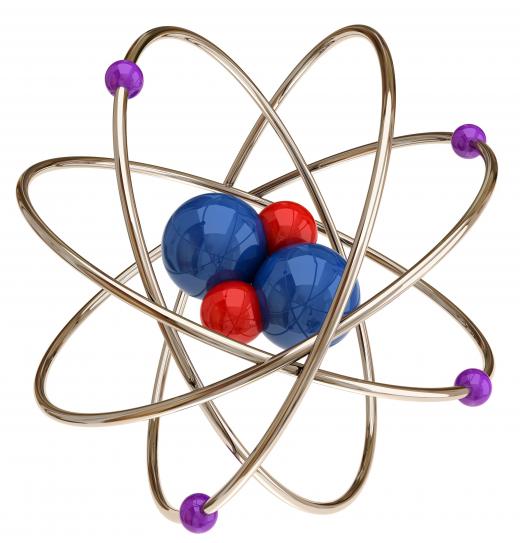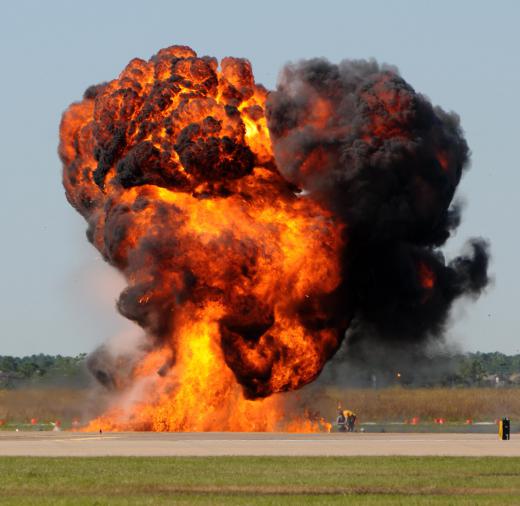What is Chemistry?
 Michael Anissimov
Michael Anissimov
Chemistry is the study of atoms, molecules, and the interactions they undergo, called chemical reactions. Through the breaking and forming of atomic bonds, various compounds change into new compounds, either producing or consuming energy in the process. Energy may be released in the form of heat or light, as in a fire or explosion. By exploiting what scientists know about chemical reactions, chemicals with useful properties can be produced.
The word derives from the slang term for the older term, "alchemist." Modern chemistry is generally thought to have begun in the 17th century, most prominently with the experiments and writings of Robert Boyle. It was Boyle that formulated Boyle's law, which holds that the temperature and volume of a gas are related.

Another important milestone was the theory of conservation of mass, developed by Antoine Lavoisier in 1783. The law holds that no mass is created or destroyed in a chemical reaction — if someone burns a log in an enclosed container, the container will weigh exactly as much as it did prior to the reaction, only it will have changed to ash. Because of his efforts in popularizing chemistry and making it more accessible to the common person, Lavoisier is often regarded as the father of modern chemistry.

Another huge milestone in the development of the field was the formulation of the atomic theory by John Dalton around 1800. Atomic theory holds that substances are made of small individual units called atoms that link together through atomic bonds. An aggregation of bonded atoms is called a molecule. Atoms and molecules make up almost everything that people can see, and interact intimately with energy, often in the form of electromagnetic radiation. It was soon realized that electromagnetic radiation can be released when the electrons in an atom transition to a lower energy state.

Today, chemistry is a fundamental part of civilization. It is used to manufacture just about everything, and chemical processing is ubiquitous and consumes a major portion of humanity's total energy budget. Being a chemical engineer is one of the highest-paying scientific careers.
AS FEATURED ON:
AS FEATURED ON:

















Discussion Comments
@Iluviaporos - Yeah, chemistry is one of those subjects like maths where kids seem to say, what's the point of knowing this? But, they don't realize that knowing chemical reactions can help out in every day life.
For example, if you are boiling fresh eggs you might have noticed that the shell will stick to the egg when you try to peel them compared to older eggs. That's because old eggs have a higher pH which toughens the skin under the shell and makes it stick better to the shell and therefore easier to lift off.
If you add baking soda (or something else that's edible) to the water of fresh boiling eggs it will increase the pH and make them easier to peel. Anyone who has taken enough chemistry to understand pH will be able to figure this out.
@browncoat - That's interesting because I feel like chemistry and other potentially hands-on subjects are often pushed at schools in order to make it easier to get everyone in the class involved.
For me, I hated the chemistry homework and the theory, but I loved doing experiments. I had a great teacher who was always setting up elaborate experiments for us to marvel at, like making the liquid in a test tube go through all the colors of the rainbow.
I guess you've just got to find what works for you in terms of learning and work with that. I think anyone can learn chemistry as long as they get the right environment. And as it says in the article, chemistry is involved at every level of our society, so it's worth knowing the basics.
I always hated chemistry as a subject when I was in school. Not because it was science based (I loved biology) but because I didn't like having to do chemical experiments. I didn't have much confidence in myself back then and I guess I thought I would end up smashing the glass somehow or spilling the chemicals.
I eventually had to take a bridging course in chemistry in order to study biology at university and it turns out that chemical theory is really interesting. I still don't really like the physical side of things (as in the test tubes, not physical chemistry!) but reading about chemistry experiments is a lot more fun than doing them for me.
@ Anon26900- Do not quote me on this because I am not exactly sure, but Butane should remain a solid if the air temperature is extremely low.
Butane is only a solid when temperatures are below 250 or so degrees Fahrenheit. I think if the air temperature rises above this you will begin to see the butane turn to liquid. Butane will remain a liquid under pressure or until it reaches its boiling point. At about thirty degrees Fahrenheit, liquid butane begins to boil turning to a gas.
Will butane remain in a solid state, if it is exposed to the air?
Post your comments